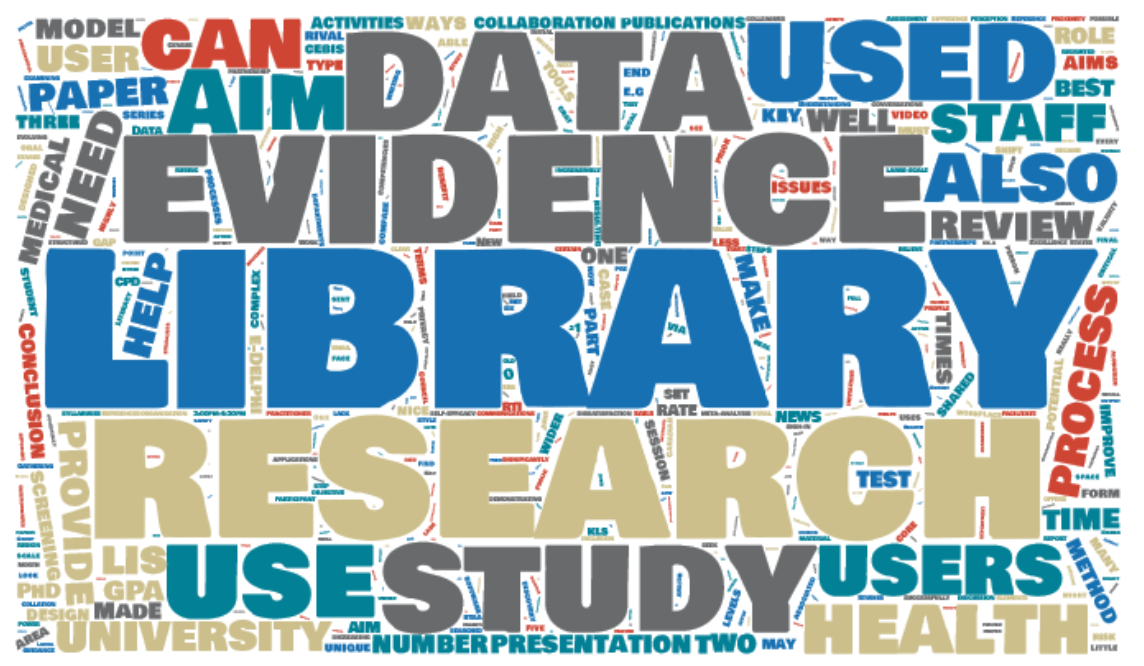(PR)EBLIP
Gearing up for EBLIP10
I’m looking forward to learning and sharing research next week at the Evidence Based Library and Information Practice (EBLIP) Conference being held in Glasgow, Scotland. This is an international, biennial conference that aims to promote the use of best available evidence to improve library and information practices within all types of libraries, and this year’s theme is “using evidence in times of uncertainty.” The conference is held over two and a half days with opportunities for both paper and poster presentations, and sessions are grouped thematically based on topic of study and/or methodology employed. In advance of the conference, I’m sharing the themes emerging on the agenda.
Students success dominates: Many sessions –much as we have seen at similar conferences such as the Library Assessment Conference — focus on supporting students and their learning; in fact, there are specific session tracks on graduate students and nursing students in particular. There are, however, a few sessions on scholarly communications that focus on faculty. One session features Richard Hayman, who will share a large-scale bibliometric analysis of faculty publishing in predatory journals. I’m looking forward to continue tracking how libraries balance the needs of students and faculty–both internationally and within the US–in the coming years given changes in scholarly communications, emerging funder mandates, and the evolving role of the library.
Demonstrating value: As libraries are under tremendous pressure to demonstrate their value, it is perhaps unsurprising that many sessions focus on research undertaken to communicate the value of the library. However, there are also a number of presentations that challenge the traditional approaches and assumptions often maintained in this research. I’m particularly eager to hear how attendees react to these challenges.
- Jung Mi Scoulas and Sandra De Groote will present findings from a recent study on how university students’ library experiences impact their academic performance.
- Brooke Robertshaw and Andrew Asher will offer a systematic review and meta-analysis that aims to synthesize the findings library impact studies.
- An entire session will focus on the use of qualitative methods to demonstrate value and impact.
Quantitative and qualitative approaches: While there appears to be a much larger share of research on the agenda that is driven by quantitative methods, there are a notable number of sessions highlighting qualitative and mixed methods approaches.
- In a session titled “Collecting users’ experiences qualitatively,” Robin Bergart and Juliene McLaughlin will speak on the value of user experience research despite the relative privilege of quantitative data. Laura Spears and Bess de Farber will also discuss their use of appreciative inquiry in facilitating action research.
- Hilary Bussell and Tatiana Bryant will share findings from an interview-driven project on gender identity and career paths.
- Jaclyn Mclean, Dede Dawson and Charlene Sorensen will present, based on semi-structured interviews, how libraries can effectively communicate collections cancellations so that their campus communities understand and support these decisions.
At the conference, I’ll be sharing findings from two recent research projects. On Monday, I’ll be speaking about international faculty survey practices and preferences with Janet Fletcher from Victoria University of Wellington. And, on Tuesday, I’ll be discussing a mixed-method approach for designing and testing new services for important campus communities based on a recent project focused on gathering student input on what success means to them.
What sessions are on your “must see” list? What trends are you seeing emerge in the agenda? I encourage both attendees and non-attendees to follow along with the conference conversations using the hashtag #EBLIP10 on Twitter starting next Monday 17 June.
